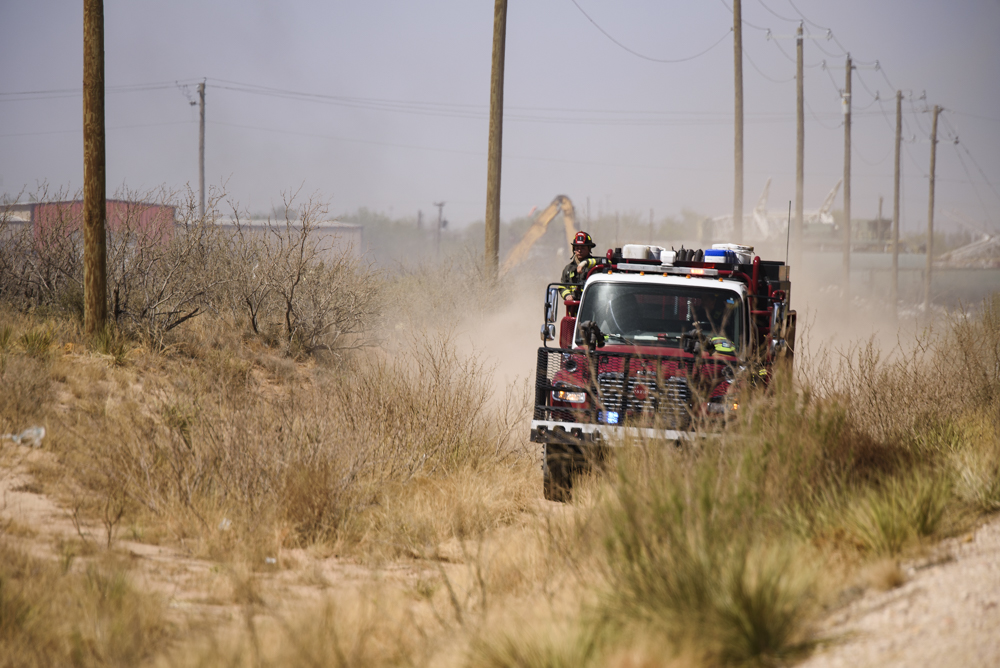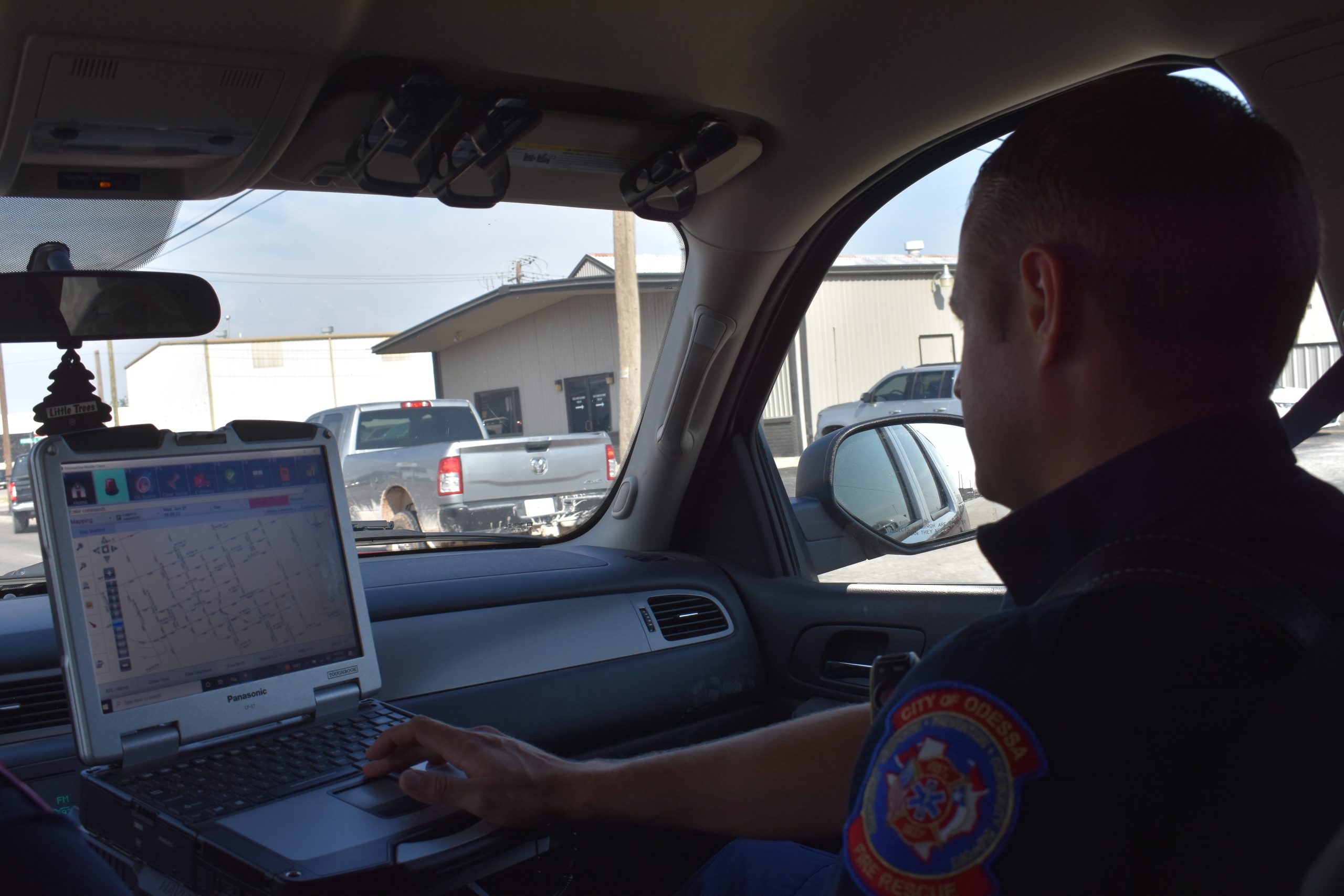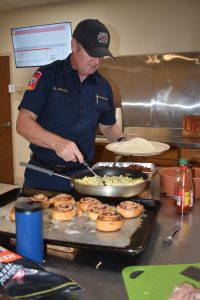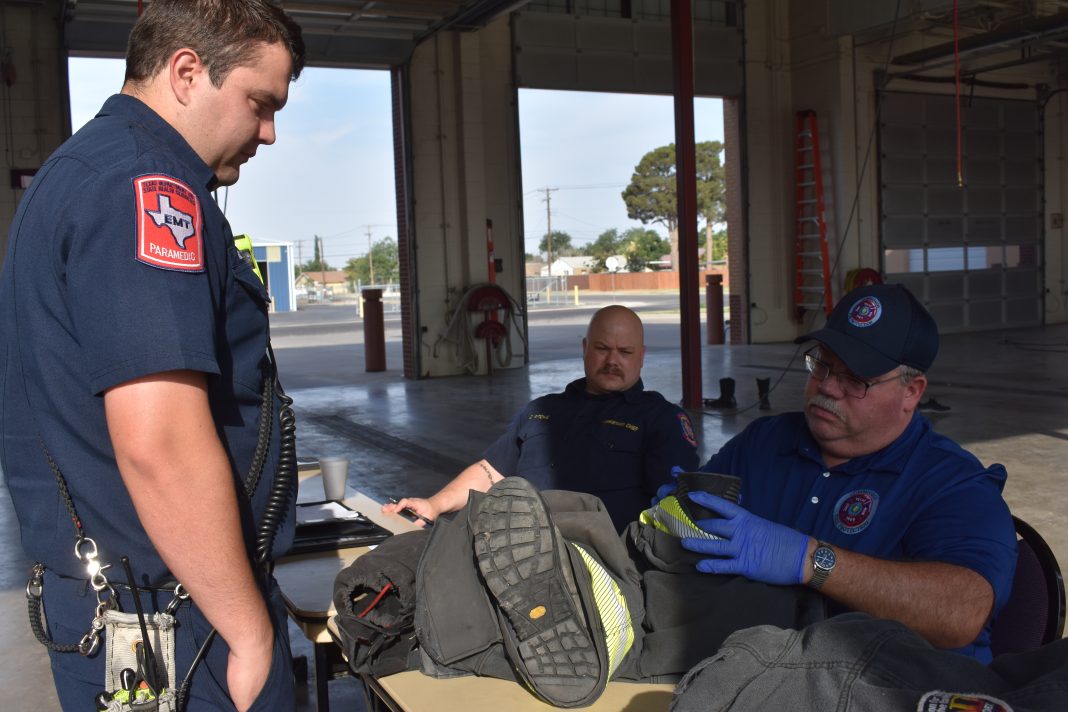Within the fire service, firefighters talk about white and black clouds.
The reporter who visited Odessa Fire Rescue’s Central station Wednesday morning was a white cloud because it was a relatively quiet four hours.
They had two calls from 8 a.m. – 11 a.m. and both were cancelled while en route with lights flashing and sirens blaring.
Bobby White said he’s been a black cloud his entire 25-year career with OFR. That means as he’s risen through the ranks of the department he’s spent a lot of time running from call to call.
White comes from a family filled with firefighters. His mom, Sally, retired from OFR in 2001 as a fire marshal. One of his brothers, Joey, recently retired as an OFR assistant chief and his other brother, Andy, is a firefighter in San Angelo. He’s also got cousins and uncles in the fire service.
For the last seven years White has been a battalion chief.
OFR’s 180 or so firefighters are divided between three shifts, A, B and C, that work 48 hours on, 96 hours off at nine stations. The two battalion chiefs assigned to each shift split up the stations and spend their days not only doing administerial work, but responding to most Priority One calls, those calls that could be life-threatening — fires, bad car wrecks, accidents involving hazardous materials, etc.
White, who heads up the B shift, starts every morning with a 7:30 Zoom meeting with all of his captains.
“We cover the calendar for the day and schedule. (We look at) what’s in-service, what’s out-of-service, what needs to go to the shop, what’s coming back. We’re trying to manage all of those different units to keep something in service,” White said.
An hour later, there’s an administrators meeting with all of the folks who are higher in rank, he said.

Every year, OFR responds to roughly 22,000 EMS, fire, rescue and hazmat calls over 903 square miles. While the City of Odessa is only 52 square miles, OFR responds to calls within unincorporated Ector County as well, the vast majority of them within West Odessa.
Stations 4, 7, 6 and Central are the busiest of the nine stations, White said.
The number of calls or “runs” per day varies, he said.
“It could be five, could be 15, depending on the weather and the people and the full moon and whatever voodoo people are spreading through the town. It’s unpredictable, but it’s always busy,” White said.
Fourteen years ago, White said he remembers going on 26 runs in a 24-hour period.
Captain Kellen Foreman from Station 4 brought his crews to Central Wednesday for an annual equipment check by the Texas Commission on Fire Protection.
A few shifts ago, the 14-year veteran said each of the two ambulance crews at Station 4 went on 15-18 runs and his engine had 10 to 15 runs.
“We share the west side with Station 7 so the west side keeps us rather busy. It’s probably the demographics around there,” Foreman said. “We also catch every fire there’s going to be in the county and since we’re kind of centrally located in town, we’re going to catch 90% of the fires in town.”
OFR’s minimum staffing level is currently 59 firefighters, including the battalion chiefs and division captains. Every station also has slightly different equipment, White said.
While every station has an ambulance and either a truck or an engine, Station 5 is set up to handle hazardous materials calls and Central Station has water tenders for wildland fires, White said.
Thanks to the raises passed by the Odessa City Council last December, White said staffing levels are getting back to where they need to be and morale has been at an all time high.
Although many of his good friends have retired in recent months, White said he’s enjoying the “new energy” their successors have brought.
Difficult, but fulfilling
The job is a fulfilling one, but it’s not for everyone, White said.
The perfect firefighter needs to come in “with their eyes wide open and their mouths and ears closed” in the beginning because there’s so much to learn, he said.
They also need to realize it’s a cool job, but it’s hard work. They don’t spend their days playing ping pong and watching TV. They’re always training when they’re not on calls, White said.
“We’re public servants and you’ve got to be able to deal with many different personalities internally and externally,” White said. “You have to represent the department in an honorable fashion. You’ve got to be willing to come work, expect the unexpected and become a team player.”
Those in the fire service also have to learn how to deal with horrific scenes and other tragedies, White said.
The toughest scenes are those involving children, he said. They were tough when his kids were young and now with two young grandchildren they’re still rough.
Although the department has a peer counseling team, White said some of the best counseling happens around the station’s dinner table.
He tries to impress upon the younger fighters they can’t fix everything, but it’s their job to do what they can to help make the situation a little bit better.
He preaches to them not to dwell on what they’ve seen.
“What’s done is done. Try not to get that burned in their brain where they just can’t get it out of their head. Some people struggle with it…but there’s a lot of experience in this department. We’ve seen and been around so we kind of know how to react to certain situations and how to help these guys and girls. They’ve just got to expect the unexpected and find that internal strength that they have.”
Ana Gonzalez, a 21-year-old firefighter/EMT currently assigned to Station 4, said she’ll never forget her first really bad scene. A vehicle had struck and killed a pedestrian.
“It was just weird having to come back because it was the middle of the night. It was hard for me to process how I was supposed to go to sleep after that,” Gonzalez said. “I had never seen anything like that, I’m not even into gory movies.”
Luckily, a couple of veteran firefighters checked up on her and made sure she was handling it as well as she could, she said.
“They were telling me that was one of the worst ones they had ever seen, so they made sure I knew I wasn’t over-reacting,” Gonzalez said. “They told me if I wanted to talk, I could. They just reassured me. It was nice.”
Juan Morales is a firefighter/EMT who joined the department a year ago and is currently stationed at Central. The 27-year-old always wanted to go into public service, but because of his current citizenship status he couldn’t join the military or the police department.
He’s discovered a love for the fire service.
“At the end of the day, we make a positive influence on a lot of people’s lives and I think that outweighs the bad stuff we see,” Morales said. “Even if it is bad, we tried to make it better, we tried to take away from that horrible moment.”
Different personalities
Perhaps that positivity is what leads to some residents calling OFR even when they might not actually need assistance.
“Frequent flyers do exist and it’s not just here. People are just lonely and they want somebody to talk to, that’s their biggest motivating factor. They want to see people. If they go to the ER they’re friends with the doctors and nurses. That’s their social life,” White said.
Newbies also need to learn how to deal with the occasional patient who verbally and sometimes, physically, abuse them, White said. Most of the time they’re under the influence of drugs or alcohol.
“People sometimes think fire and (police officers) are at their complete disposal and they can say and do what they want, but we’re human like anybody else. You spit on us, try to hurt us, we’re going to stop it,” White said. “We’ll be tactful and professional about it, but they’re not going to do it again.”

Chris Waite, a firefighter/paramedic who was teamed up with Morales Wednesday, said sometimes it’s easy to de-escalate the situation.
“Last night we had a call. A guy passed out or asleep in the middle of the street,” Waite, 29, said. “When he woke up he was agitated that we were there, but once we started talking to him and telling him ‘We’re just here to check on you, your neighbors were obviously worried about you,’ he kind of calmed down and was like, ‘OK. I understand. I appreciate y’all, but I’m fine.’”
On the positive side, White said people routinely drop by the station with cookies and other goodies because they are so grateful for the work they do.
“Sometimes we’ve made such a difference people think they owe us, which they don’t, but there are a lot of good people in Odessa that come back and try to pay us in their own special way,” White said.
The future
White said some people have quit at the end of their first day, but there are plenty of firefighters who thrive from the get-go like Division Captain Terrey Brumbalow.
At 33, Brumbalow is getting ready to be the youngest battalion chief in OFR history.
“Some guys you realize pretty quick they’re someone you’re going to want to watch, someone you’re going to want to mentor,” White said. “You start paying attention to them because they take care of business on the scene, off duty they’re good people. They’re exceptional firefighter paramedics and they go above and beyond the norm.”
Younger firefighters can look at Brumbalow and have hope they, too, can climb the ladder, White said.
“He’s made it early. He’s earned it. The guys respect him for it,” White said. “It’s a good thing for the department. Young blood coming in. Youth growth. New energy. New vibes.”
Brumbalow started out as a volunteer at a small fire department south of Fort Worth and moved to Odessa for the job 14 years ago. He’s since married and had kids.
“That’s kind of one of our hidden recruitment tools. We get them here, have them meet our wives’ and our girlfriends’ friends so we can keep them here if we can find the right match and be a matchmaker. Make it happen,” White said.
Brumbalow, who admits to being an adrenaline junkie, said he doesn’t have a specific go-to story he could use as a recruitment tool.
“I would just go to the overall. We love doing the action stuff. We love jumping in there and getting it done right,” Brumbalow said.

Morales and Waite said there are a few misconceptions about their way of life.
A lot of people often don’t understand why fire engines and ambulances sometimes show up to medical calls not realizing the crews can fight fires and provide medical care, Waite said. They also don’t realize extra manpower is sometimes warranted.
Another misconception has to do with their meals.
They pay for their own.
Every paycheck B shift crews put $50 apiece into a food fund. Typically B shift prepare two meals a day.
Waite and Morales had to delay their breakfast Wednesday though, they had an early morning med call and then, later, a fall victim call.
After their last call was cancelled, Waite and Morales headed back into the station to warm up their breakfast.
It was 10:30 a.m.
“Firefighters are known for their breakfast. Retirees come back to eat breakfast,” White said.




